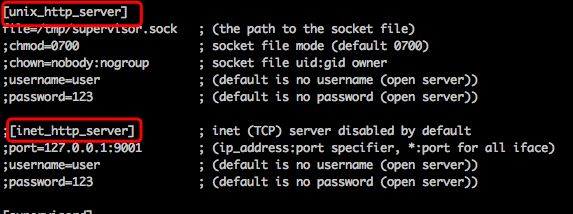当linux设备上开启sonar6.2时,
supervisorctl status报如下错误:
error:
关闭sonar6.2时,报如下错误:
error:
据说要关闭防火墙
/usr/sbin/sestatus查看防护墙状态
cat /etc/selinux/config查看防火墙配置
SELINUX=disabled关闭
原来是这两行注释掉了
[inet_http_server] ; inet (TCP) server disabled by default
port=*:9002
tmd,supervisor.conf的配置太坑了,不小心就会出错
另外附一个坑点:supervisord.conf的配置里的注释符,注意分号前后的空格,注释符和配置之间要至少有一个空格
上面的方法,指标不治本,通过下面的命令,我们知道supervisord会在如下路径,寻找名字为supervisord.conf的配置文件
[etc]$ supervisord
Error: No config file found at default paths (/usr/local/etc/supervisord.conf, /usr/local/supervisord.conf, supervisord.conf, etc/supervisord.conf, /etc/supervisord.conf, /etc/supervisor/supervisord.conf); use the -c option to specify a config file at a different path
For help, use /usr/local/bin/supervisord -h
注意上面有绝对路径和相对路径
这里注意两点,一个是配置文件的名字,不能是其他名字,如果是其他名字,就需要启动时指定配置文件的路径和名字;二是路径包含在搜索路径内
1、supervisord -c /a/b/x/s/super.conf。这样启动的supervisor可以任意路径和任意的配置文件名字;
但是,执行supervisorctl的时候,也要指定配置文件的名字和路径,像:supervisor -c /a/b/x/s/super.conf status这样
如果你直接执行supervisorctl status,就会报下面的错误
error:
2、另外sonar6.2会默认使用9001端口,keepalived也默认会使用9001端口,所以应该注意端口冲突问题
3、执行命令supervisord 和 supervisorctl 的时候,都会在默认路径下搜索配置文件;
error:
4、再说一下上面治标的原因:启动supervisor有连个方法,一个是sock,另一个是下面的方法
supervisor.sock是以.sock 为后缀的文件而已,UNIX 系统不以后缀区分文件类型,但为了识别,通常使用后缀来标识一下。.sock文件通常是UNIX 域套接字(UNIX domain socket),即通过文件系统(而非网络地址)进行寻址和访问的套接字
上面的是Unix domain socket,是操作系统内部通信,所以只可以本地访问
下面的tcp通讯,可以远程访问和本地访问
详细区别参考:
https://en.wikipedia.org/wiki/Unix_domain_socket
https://lists.freebsd.org/pipermail/freebsd-performance/2005-February/001143.html
Unix domain socket
A Unix domain socket or IPC socket (inter-process communication socket) is a data communications endpoint for exchanging data between processes executing on the same host operating system. Like named pipes, Unix domain sockets support transmission of a reliable stream of bytes (SOCK_STREAM, compare to TCP). In addition, they support ordered and reliable transmission of datagrams (SOCK_SEQPACKET), or unordered and unreliable transmission of datagrams (SOCK_DGRAM, compare to UDP). The Unix domain socket facility is a standard component of POSIX operating systems.
The API for Unix domain sockets is similar to that of an Internet socket, but rather than using an underlying network protocol, all communication occurs entirely within the operating system kernel. Unix domain sockets use the file system as their address name space. Processes reference Unix domain sockets as file system inodes, so two processes can communicate by opening the same socket.
In addition to sending data, processes may send file descriptors across a Unix domain socket connection using the sendmsg() and recvmsg() system calls. This allows the sending processes to grant the receiving process access to a file descriptor for which the receiving process otherwise does not have access.[1] This can be used to implement a rudimentary form of capability-based security.[2] For example, this allows the Clam AntiVirus scanner to run as an unprivileged daemon on Linux and BSD, yet still read any file sent to the daemon's Unix domain socket.
https://en.wikipedia.org/wiki/Unix_domain_socket

